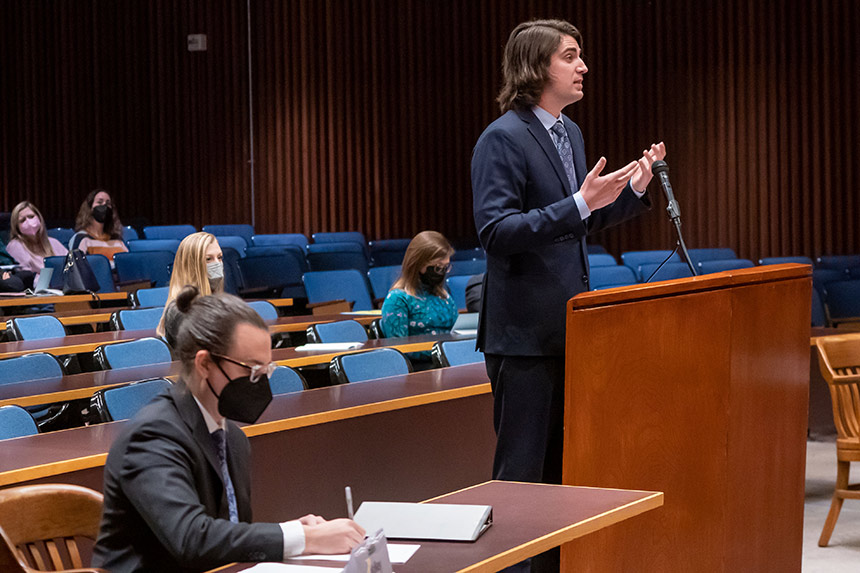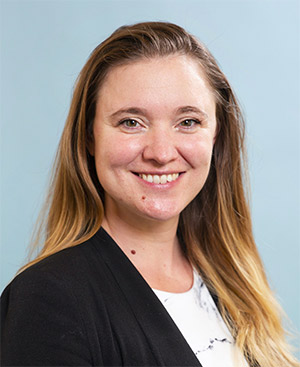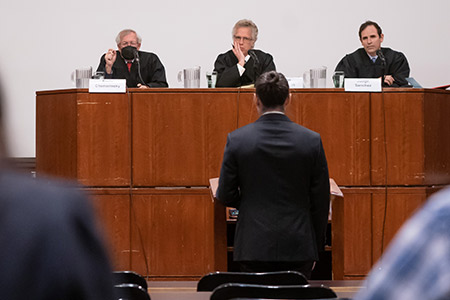
By Gwyneth K. Shaw
For more than five decades, Berkeley Law’s storied James Patterson McBaine Honors Moot Court Competition has given interested students the opportunity to try a mock Supreme Court-style argument in front of faculty, practitioners, and jurists.
Every year, the school’s advanced appellate contest — a jewel in an increasingly loaded crown of advocacy competitions — is based on a problem selected from real-life decisions involving the most pressing issues of the day. Some students represent the petitioners, others the respondents, and this year they received their case problem details before Thanksgiving.
Competitors submitted their briefs in mid-February and started the first round of oral arguments Feb. 27. Students advance to the quarterfinals, semifinals, and final round based on the quality of their brief and their performance in the preliminary rounds of oral argument, with the brief counting for at least half of the available points in the earlier rounds. The student who presents the best oral argument is declared the winner, with additional prizes for the best briefs in both the petitioner and respondent categories.
This year’s final, argued on March 20 in Berkeley Law’s Booth Auditorium, was judged by an elite panel: Judge Jacqueline Nguyen of the U.S. Court of Appeals for the Ninth Circuit, California Supreme Court Associate Justice Martin Jenkins, and Judge Kevin Newsom of the U.S. Court of Appeals for the Eleventh Circuit. The contest is open to the public.

“We’re incredibly honored to welcome such an esteemed panel of judges to evaluate the oral arguments of this year’s finalists,” Advocacy Competitions Program Director Natalie Winters ’18 said before the event. “The panel brings a diverse range of backgrounds and viewpoints that will enhance the final-round experience for the advocates and the audience members who join us.”
The judges shared Winters’ enthusiasm.
“I have a number of friends — including two former co-clerks — on the faculty at Berkeley, and I was so fortunate to have Berkeley grad Emile Katz in chambers last year,” Newsom said. “I’m excited to see the students perform.”
Jenkins said he’s grateful for the “opportunity to take part in training the next generation of lawyers,” and looked forward to working with colleagues from the federal Courts of Appeal.
“I view moot court as a vital part of any law school education experience,” he says. “It provides students with a unique opportunity to develop and polish the skills they will need to be successful as lawyers, including legal research and analysis, persuasive writing, and effective oral advocacy.
“Participants receive ‘real time’ feedback on their skills and how their legal arguments and presentations hold up under the glare of live and rigorous questioning.”
The trio also participated in a panel organized by the Career Development Office about judicial clerkships and pathways to the bench.
A vaunted tradition
The case in question for this year’s competition concerned how the Supreme Court should review laws that restrict the ability of social media platforms to moderate user-generated content under the First Amendment, and whether such laws are constitutional. The Fifth and Eleventh Circuit Courts of Appeal have split on both questions.
Noah Cohen ’24 faced off with Eric Wright ’24 in the finals, and Cohen won the competition.
Lauren Trombetta ’23, who is serving in the role of student director alongside Max Segal ’23, was excited to experience McBaine in person for the first time.

While contestants attend training sessions on brief writing and oral argument and can consult with the student directors and academic directors throughout the process, they receive minimal guidance and aren’t allowed to seek outside help from anyone — including fellow students — on their briefs.
That makes the big reveal of each competitor’s oral argument a true highlight, Trombetta says.
“Because the competition requires competitors to research and write our briefs independently, I enjoyed finally hearing the creative and compelling arguments of my fellow counselors during oral arguments,” she says.
The experience, especially the chance to argue in front of acclaimed jurists, is a landmark moment in law school for participants. And it draws alumni back into the school as well — this year’s academic director is Greg Washington ’17, winner of the 2017 contest.
“The McBaine Competition is very special at Berkeley Law in providing students a chance to engage in appellate advocacy with excellent judges to provide them feedback,” says Dean Erwin Chemerinsky, who served as a judge in the final round last year. “This year, we are incredibly fortunate to have three terrific judges taking time from their very busy schedules to come to Berkeley Law.”